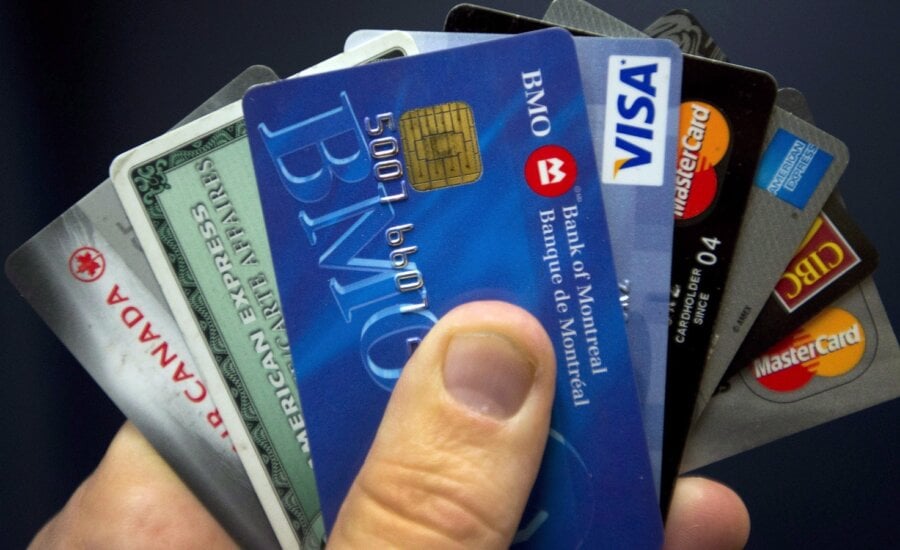Fee-based credit cards come with perks—but they aren’t for everyone
Premium credit cards can offer great rewards, but the annual fee is only worth it if the perks fit your spending habits and lifestyle.
Advertisement
Premium credit cards can offer great rewards, but the annual fee is only worth it if the perks fit your spending habits and lifestyle.

Better store discounts, access to airport lounges, and early entry to your favourite live acts. The perks of some credit cards are hard to ignore, even if the card comes with an annual fee. But experts say they may not be for everyone. “It really depends on your income, how much you spend on the credit card, as well as your credit score,” said Natasha Macmillan, director of everyday banking at Ratehub.ca. There’s an array of choice when it comes to picking the right card, each having its own unique features and perks.
Credit cards that come with more perks and benefits are likely to carry an annual fee, which can be as high as $799. Most credit cards on the market though have fees closer to $120 per year, she said.
Macmillan said consumers need to look at where they are in their lives when applying for a credit card. For students and young adults, she recommended looking into a no-fee card, which can help build your credit score without the added expense of a fee. Macmillan said secured credit cards—which require a cash deposit—work great for people building or rebuilding their credit scores. These cards are more accessible compared with other kinds of credit cards and don’t carry a monthly or yearly fee.
For an early-career individual or a young professional who may have a better grasp on their spending habits, a fee-based credit card could help unlock perks that align with their lifestyle, Macmillan said.
But it’s important to do the math beforehand, said Melissa Leong, author of Happy Go Money. “Write down numbers. Write down the annual fee, maybe figure out the earn rate,” she said. The earn rate is the percentage or number of rewards you get for every dollar spent on the card.
Leong said if a credit card requires a minimum spending threshold to access its perks and it’s encouraging you to spend when you otherwise might not have, then it may not be right for you. “You’re trying to align the card to your life, not the other way around,” she said.

Scotiabank Gold American Express Card

American Express Cobalt Card

MBNA Rewards World Elite Mastercard
Understanding your annual spending habits is key when applying for a fee-based credit card, said Jessica Morgan, founder and CEO of financial blog site Canadianbudget.ca. There are rules to earning rewards, she said. Some may offer higher rewards for spending money at a gas station, while others may have better perks for those who eat at restaurants often or travel avidly. “If those are categories that you are frequently spending in, then it might make sense to look at cards that align with that level of spending,” Morgan said.
Macmillan said cards with an annual fee typically offer higher reward rates, but they only make sense if you aren’t carrying debt. “The premium credit cards usually work best for individuals who use their credit cards often, who pay their credit card balances in full each month,” she said. They’re also only worth it if you’re using the perks.
With the higher cost of living nowadays though, more people have been opting for cash back credit cards because it can help offset daily expenses, Macmillan said.
Leong likened fee-based credit cards to subscriptions, suggesting people set a calendar reminder ahead of the yearly fee renewal to assess whether it’s still worth the extra money. “Ask yourself a couple of questions: Did I use the perks it provides? Is it worth the value for the fee? And do I carry a balance?” she said.
Often, people think they’re going to use the perks of a fee-based card, but that doesn’t always happen. Leong said if people haven’t used the perks by the time the yearly fee renews, it’s unlikely that’s going to happen after the renewal.
For those carrying a balance, Leong said the perks shouldn’t be a priority. Instead, they should opt for a low-rate, no-fee card and curb new spending until the balance is paid off.
Many Canadians carry multiple credit cards. Morgan said having multiple can give a bit more flexibility and backup. And if those cards are free, there’s no added cost. However, she warned not to apply for multiple credit cards at once because it can affect your credit score.
“Just be mindful of how frequently you’re applying for different cards,” Morgan said. “The best way to get the benefit of any credit card is to not have to pay any interest on it.”
Share this article Share on Facebook Share on Twitter Share on Linkedin Share on Reddit Share on Email